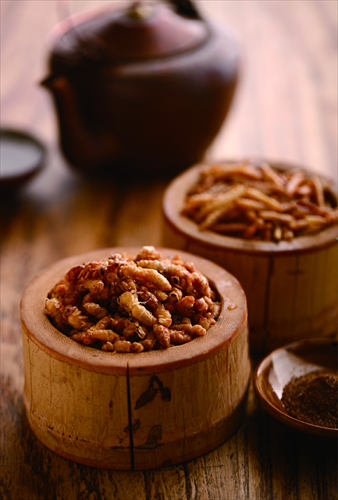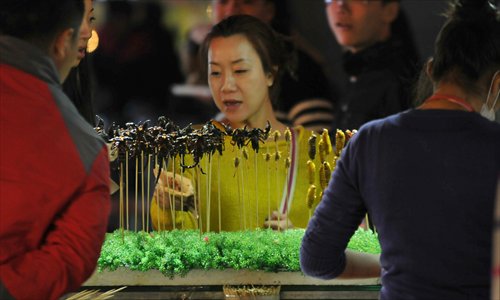Insects. Food of the future?
Eating worms has both nutritional and environmental benefits, say the experts

Adventurous diners are trying insect food which is said to be rich in protein. Photo: Courtesy of In & Out restaurant
On a big table laden with sizzling meat, scrumptious vegetables and cold dishes, Pony Wu plucked up the courage to pick up a fried silkworm in front of him, because that's what his friends were doing.
"It tasted a little bitter and a bit hard to swallow. I chewed it carefully and got it down my throat by eating it with other vegetables," said Wu.
After the first bite, Wu took a moment to reflect on the feeling of actually having eaten an insect. But it didn't feel as he expected - the feeling of a silkworm crawling into his body.
"The more I ate it, the more I wanted to eat of it. I just couldn't control my desire [to eat more silkworms]," said Wu.
That night, he ended up eating a whole plate of silkworms.
Wu's new culinary craving is hardly unusual. The trend of eating insects has been gaining popularity in recent years, both in China and elsewhere. Many insect eaters are not put off by the idea held by most people that eating insects is disgusting.
In a May interview with The Guardian, the United Nation's former secretary-general Kofi Annan said people should eat more insects because they are "good for the environment and for eating a balanced diet."

Diners enjoy a bug food feast in Shenyang, Liaoning Province. Photo: CFP

A foreigner eats a grasshopper in Qingdao, Shandong Province. Photo: CFP
Chinese insect cuisine
Gao Xiaosu is keen on cooking with insects. Back in her hometown in Yunnan Province, dishes like honeybee pupae served either with asparagus lettuce in cold dishes or with cross-bridge rice noodles, deep-fried grasshoppers and grilled ants, are all her favorites.
"Insects are delicious and they are rich in protein, which is nourishing," said Gao.
After leaving her hometown, Gao opened a restaurant in Beijing's Dongcheng district, called Taste in Dongsisitiao.
On the menu is her signature insect dish - chongzi ganji (insects go to the fair).
The dish consists of bamboo worms, honeybee pupae and grasshoppers. The three kinds of insects are fried separately and eaten with a specially-made spicy sauce.
"This dish is served all year round. The insects are flown in from Yunnan Province," said Gao.
During peak times each month, she serves about five kilograms of insects in her 50-square-meter restaurant that only has five tables.
"Among my customers, German and Swedes like the dishes the most. The Japanese like to eat them with alcoholic drinks. French people don't generally like eating insects," said Gao.
She recalled that once a French woman cried when she was served chongzi ganji, because she saw a big bee on the plate.
He Xuehuan, the executive chef of a Yunnan restaurant chain called In & Out, said previously they used to serve many insect dishes including water dragonfly and grasshopper. Now they only serve two of the most popular insect dishes: bamboo worms and honeybee pupae.
"The bamboo worms and honeybee pupae are deep-fried and crispy. They are well received by diners," said He. "Most people who try insect food are young couples who want to try something new. Diners aged between 40 and 60, also account for a large portion of insect eaters."
He also said that stir-fried and deep-fried are the two most common insect cooking methods, and the best season for bug eating is between August and October, when the insects are fat.
Tempting Western palates
Bug eating is not new to Chinese people. It's a common practice in Asian and African countries. But on continents where it was not popular, the idea is gaining momentum, with numerous websites promoting entomophage - the scientific term for bug eating.
US chef and author David George Gordon, 65, is famous for promoting entomophage. He published a book titled The Eat-a-Bug Cookbook to introduce the art of cooking bugs.
"The bugs taste good. They are also quite abundant and are more environmentally friendly than most other sources of protein," Gordon told Metropolitan.
His two favorite bug dishes are made of tarantula spiders and grasshoppers.
"I coat tarantula spiders in tempura batter and deep fry them, which tastes like soft-shelled crab. For the grasshoppers, they are marinated in teriyaki sauce before they are skewered and grilled, which tastes like sweet green peppers," said Gordon.
According to Gordon, the most commonly eaten bugs in the US are European house crickets and mealworms.
Gordon said most people are amazed by the bug dishes he cooks and often they will request second or even third helpings of the dishes.
"Most first-time bug eaters are very appreciative of my cuisine, which is simple, direct. The bugs are prominently displayed, not ground into flour or buried by sauces or other ingredients," said Gordon.
"Our culture dislikes insects. Most people think bugs are germ-ridden and gross, when in fact, we desperately need their services as pollinators, decomposers - and, yes, food for other animals and ourselves," said Gordon, adding that his cooking demonstrations help people get over their fear of insect cuisine.
He said the biggest obstacle to getting Westerners to eat insects is to change their misunderstanding about bug eating.
Canadian Chris Hawke, 46, has tried eating insects in Myanmar, Japan and China, including crickets and a giant beetle. He even ate tree bark and moss out of curiosity, he said, but he's still not over his insect eating experience.
"I have no plans ever to eat a bug again unless it's a chocolate covered ant," said Hawke.
Environmental benefits
According to a May article in Time Magazine, rearing livestock globally accounts for 18 percent of greenhouse gas emissions. Given that eating insects is more environmentally friendly and cheaper than eating meat from livestock, the article holds the view that insects could become the future food of human beings.
"This is an idea that shouldn't just be ridiculed," Paul Vantomme, an officer with the UN Food and Agriculture Organization, told Time Magazine.
Another reason chefs are promoting bugs as food, is that they consume less resources than livestock. According to Time Magazine, bugs which are cold-blooded consume less to regulate their body temperature, compared with pigs and other warm-blooded vertebrates.
Gordon said that he is optimistic about the future of insect food because of the benefits insect eating can provide.
"Insects have become much, much more popular in the US over the past six or seven years - ever since the United Nations released its report urging people to start raising and eating more bugs. There are many new companies selling products made from cricket "flour"- energy bars, cereals, etcetera," said Gordon.
Nutritional goodness
Insects also have great nutritional value. Nutritionist Yang Wenjiao said that the protein of a 100-gram insect is generally higher than the same weight of meat and other starchy food.
But she added that cooking methods play an important role in preserving the nutritional benefits of bugs.
"Many of the insects are deep-fried. This is an unhealthy cooking method which could diminish the nutrients. The excessive fried protein will produce some hazardous carcinogens like acrylamide," she said. "If people can eat the insects boiled or steamed, that would be better."
Yang suggested that insect lovers limit their choices to common insects.
"We don't know whether some insects are poisonous, so people should avoid eating rarely seen insects out of curiosity," she said.
People should also be careful about protein allergies when eating insects, she warned.
People who would not eat insects can however get enough protein from eating eggs, fish and shrimp, added Yang.
Wu said that if he gets another chance to eat bugs, he will happily do it.
"Besides the nutritional benefits, I will feel good about doing my bit for the environment next time I eat insects," he said.
Chen Haonan contributed to this story